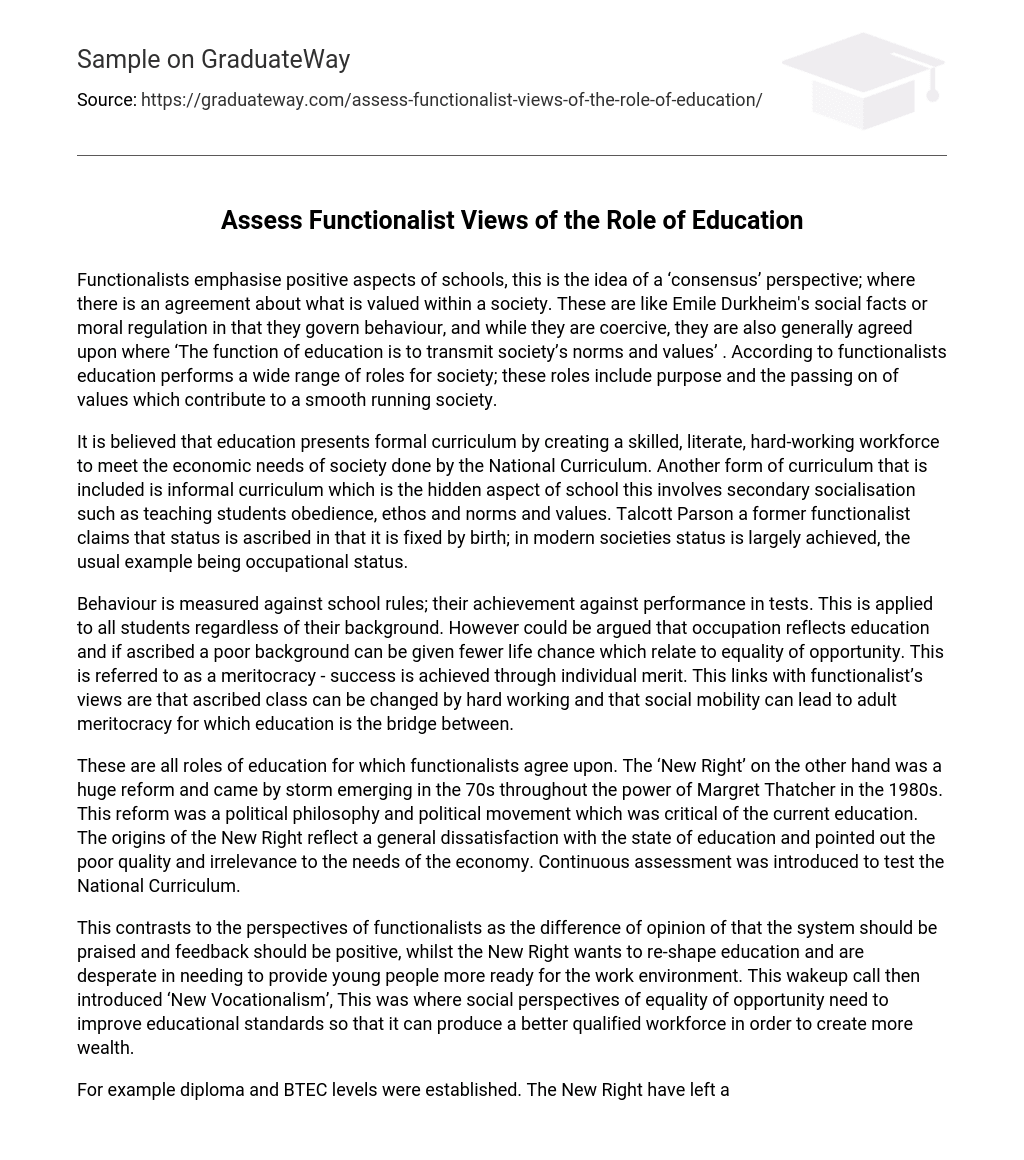Functionalists emphasize the positive aspects of schools, aligning with the ‘consensus’ perspective that highlights agreement within society on what is valued. These values, akin to Emile Durkheim’s social facts or moral regulation, shape behavior and are widely accepted. Functionalists argue that education plays multiple roles in society, such as providing purpose and transmitting societal norms and values, all of which contribute to maintaining a harmonious society.
The National Curriculum is believed to provide formal education by developing a competent, literate, and diligent workforce to address the economic requirements of society. Additionally, education includes an informal curriculum which encompasses the hidden aspects of schooling. This includes imparting secondary socialization through teaching students obedience, ethos, and norms and values. Talcott Parson, a former functionalist, argues that status can be ascribed, meaning it is predetermined at birth. However, in contemporary societies, status is mostly achieved, with occupational status being a common example.
The assessment of behavior is based on school regulations, while achievement is determined by exam performance. These criteria apply to all students, regardless of their background. However, some argue that occupation reflects education and individuals from disadvantaged backgrounds may have fewer life opportunities, which contradicts the idea of equal opportunities. This concept is called meritocracy, where success is attained through personal merit. It aligns with functionalists’ perspective that social class can change through hard work and education serves as a way to enable social mobility and establish an adult meritocracy.
These are the roles of education that functionalists agree on. However, the ‘New Right’ movement, which emerged in the 70s and gained power through Margret Thatcher in the 1980s, was a significant reform. It was a political philosophy critical of the existing education system, driven by dissatisfaction with its poor quality and lack of relevance to the economy. As part of this reform, continuous assessment was introduced to evaluate the National Curriculum.
Contrary to the views of functionalists who believe in praising the system and giving positive feedback, the New Right advocates for a reshaping of education to better prepare young people for the workforce. This prompted the introduction of ‘New Vocationalism’, which aims to improve educational standards and provide equal opportunities, ultimately resulting in a more qualified workforce and increased prosperity.
The education system has been reformed by the New Right through the establishment of diploma and BTEC levels. This reform aims to benefit every individual in society. Another perspective that critiques the functionalist view is that of Marxists. Like functionalists, Marxists believe that schools prepare young people for adulthood and the future society they will encounter.
Conflict theorists, unlike functionalists, hold a negative perspective on this phenomenon, viewing it as a means of controlling the thoughts of younger individuals. This viewpoint is referred to as the ‘conflict’ theory and has gained traction in opposition to the functionalist standpoint. According to this theory, society consists of groups with varying interests, and certain groups derive advantages from their positions in society. Marxists acknowledge that education can bring about positive transformations but stress that broader social changes must also occur alongside these shifts.
Bowles and Gintis (1976), like Marxists, view work as exploitative and alienating. They argue that meritocracy is a false notion and instead propose the ‘correspondence theory’. This theory promotes the values that are expected of individuals in each social class and aims to prepare students for the specific jobs typically held by members of their class. They suggest that schools replicate the work environment to produce compliant workers. The concept of hidden curriculum is also mentioned in functionalism, but it is seen as a negative aspect due to its conflictual nature.
The reason for this is that it is believed to demonstrate the Marxist perspective on education, which suggests that it conveys implicit ideological messages to young individuals. This includes the creation of compliant employees who can be easily influenced by their employers, similar to how students must comply with school regulations in order to comply with workplace rules later on. Marxists also argue that education perpetuates a ruling class ideology by endorsing competition and legitimizing inequality.
Feminists argue that society revolves around men’s interests and women are relegated to subordinate roles compared to men. This perspective held by Feminists aligns with distinct theories different from those of functionalism and Marxism. The reason for this is that these ideologies propose different issues. For Feminists, the primary concern is inequality. In contrast, functionalism asserts that the education system is effective, whereas Marxism suggests otherwise. Meanwhile, Feminists stress that both the education system and broader society are patriarchal in nature.
They create formal connections and favor boys in the hidden curriculum, highlighted by the presence of male teachers dominating subjects typically perceived as “male subjects”, thus reflecting a patriarchal society where males hold dominance economically, politically, and socially. Nevertheless, over the past three decades, Feminists have effectively elevated the status of girls in education and are bridging the gap of inequality, thereby promoting equal treatment among all social groups.
Functionalists do not consider the idea that inequality can be socially constructed and that education perpetuates inequality. In contrast, the Liberal/de-schooling approach views education as a means to enhance the individual’s well-being rather than focusing on societal improvement. These perspectives differ from functionalists’ beliefs as they propose contrasting roles for education. Ivan Illich argues that school suppresses a child’s spirit by eradicating their sense of identity and independent thinking, resulting in the production of thoughtless automatons.
In contrast to functionalists, liberals emphasize the importance of education in fostering independent thinking and prioritizing individual well-being, advocating for freedom from conforming to group demands. Sociological perspectives on the role of education can be categorized as either consensus or conflict viewpoints. While functionalists share some common values with other perspectives, they strongly believe that education functions as a system of interdependent parts held together by a shared value system.





